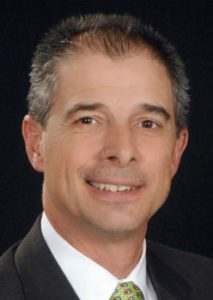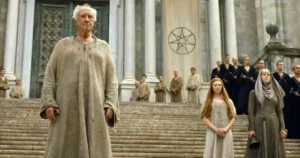After hearing so much ballyhoo, I finally broke down and started watching Game of Thrones. As usual, I am late to the party (GOT premiered in 2011). My wife has long refused to watch it, but I finally caved, so she’s Downton Abbey-ing while I’m binging on gore. It’s more than a little graphic, but it did win 59 Emmy Awards. Maybe even a pastor could be forgiven for indulging?
I’ve enjoyed similar shows, set in bygone eras, ancient times, because of their depictions of life in those settings. Based on a series of fantasy novels, there is not much actual history to be learned from Game of Thrones, but glimpsing the life and lifestyle of what might be a dark 15th century Europe is intriguing. We have advanced quite a bit. And are just as barbaric.

Russ Dean
Our “civilized” society is not beheading our enemies anymore, but the damage done by the beloved AR-15 is no less gruesome. Our children are using them to massacre other children in our schools, and we sit idly by, and the endless supply of weapons of mass destruction we’ve amassed (our cherished “security”) is surely an even more terrifying menace than “wildlings north of the wall.”
I have some faith that the “moral arc” is, in fact, bending toward justice, but some of our so-called leaders are just as embarrassingly depraved as the immoral kings of legend. Their dragons hatch from scaled eggs. Our demons are just as real.
Further, and more to the point, in all these period pieces I am fascinated by the depiction of religion, both the historical accuracies and the cynical dramatizations. Game’s 15th century ethos is polytheistic and animistic. Spirits are loose in the world, and each tribe cowers and coddles its own gods.
In every episode someone invokes “the old gods,” and every time I hear the phrase, glimpse that archaic theology, I’m again wondering how much we actually have advanced from our brutish, superstitious past. Invariably the invocation of the gods derives from fear (save us from our enemies), or selfish ambition (give us conquest over their lands, their lords, their loot). Sound familiar? I’ve heard many invocations, offered from pulpits and in the halls of power, that sound a lot like this, offered to sanctify the last 30 years of our unending wars.
“I’ve heard many invocations, offered from pulpits and in the halls of power, that sound a lot like this, offered to sanctify the last 30 years of our unending wars.”
A colleague who just visited with family told me of attending a crowded gathering. She donned her KN95 for the crowd, while an unmasked sibling confided, “Well … I prayed.” Is this 21st century faith, or are the old gods still alive and well?
I could cite countless examples like this one, when the expressions of faith, if we think deeply about them, can hardly be disentangled from ancient superstition. “I’ve always had good luck with prayer,” the old farmer told his pastor. So, which is it, luck or prayer? Coincidence or providence?
Is it mask or pray, or mask and pray?


Amen? Can these really be expressions of modern faith, or are the old gods still with us?
Those of us who grew up immersed in the “language of Zion” may be able to overlook the illogic, the conflict, the implications but, increasingly, a culture raised on the science that is today’s reality cannot — and will not. This is not science fiction. It’s reality. We can keep walking headlong into this disaster, fighting a “culture war” we cannot win, or we can adjust, as the church always has done. Think Copernicus, Galileo, eugenics, civil rights, ERA.
In each historic movement, the church adjusted. We learned to read the Bible again. We never had to throw it out. We rethought our theology, reshaped our vision of God. (Which is different than reshaping God.) It’s time. Again.


God is, and always will be. But “he” isn’t the Man Upstairs, the most powerful of the old gods, the omnipotent controller of all things. God is, and always will be. The God of myth and meaning, justice and love, the Spirit that calls us, beckoning us to find the sacred within the secular, the mystery in the mundane, life beyond just living — that God (which is to say, God) can still speak to a quantum world.
But if the church has any future for the lives of our children, we must learn a new language and let the old gods die.
Russ Dean serves as co-pastor of Park Road Baptist Church in Charlotte, N.C. He holds degrees from Furman University, Southern Baptist Theological Seminary and Beeson Divinity School. He and his wife, Amy, have been co-pastors of Park Road since 2000. They are parents of two sons. Russ is active in social justice ministries and interfaith dialogue. He is author of the new book Finding A New Way.
Related articles:
Holy Week and Game of Thrones: hospitality and welcome when our ‘winters’ inevitably come | Opinion by Susan Sparks
Reimagining the ‘kingdom’ of God as something other than an ancient hierarchy | Opinion by Rick Pidcock
A world still charged by flame: finding God in the singed pages of the Old Testament | Opinion by Greg Jarrell




















![[Book Review] The Blade Itself (The First Law Trilogy) by Joe Abercrombie](https://bendthekneegot.com/wp-content/uploads/2018/01/1516047103_maxresdefault-218x150.jpg)
















